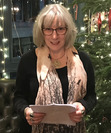Paula R.C. Readman's Blog, page 48
March 20, 2021
Stone Angels Kindle Free to Download

As I have a new novel being release this year I’m giving readers the opportunity to download my first published Gothic crime novel Stone Angels for free this weekend. I’m hope that new readers of my work will enjoy the chance to download a dark, disturbing novel about an artist’s obsession with painting ten masterpieces to create his ultimate art exhibition.
Narrating the story in the first person, Paula Readman truly gets inside the madman’s head and gives the reader a chilling glimpse into what drives him.
I was totally engrossed by this character-driven suspense horror. It is dark, deep and thoughtful. No cheap thrills here, but pure artistry. Recommended.
Bookmark Reviews
VINE VOICE
5.0 out of 5 stars Chilling and fascinating
Reviewed in the United Kingdom on 16 February 2021Verified Purchase
I do hope you take the opportunity to download Stone Angels this weekend. If you do, please once you have read it please leave me a review. Short or long I will be please to hear you thoughts on my first novel. Click on this link.
Have a great weekend.
March 19, 2021
A Face From the Past
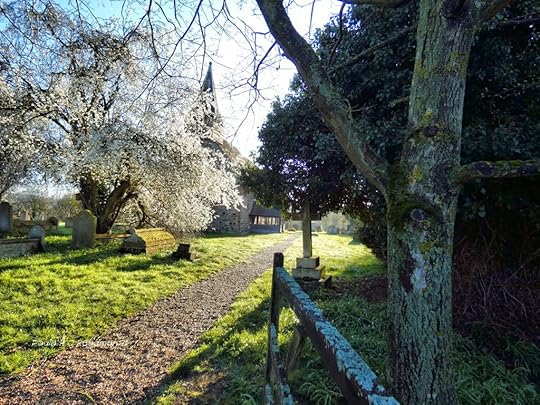
The walk this morning took us to the Holy Trinity church, Bradwell-juxta-Coggeshall. It took us a total of 102 minutes in bright sunshine, which made a nice change after so many dull, wet mornings. We walked along the road as there was more heavy rain last night, not wanting to slip and slide our way around the fields.

Holy Trinity church building is a simple flint rubble single cell structure built by the Normans in the early 12th century and looks as much as it did when originally built. The only changes happened around 1320 to 1340 when several of the Norman windows were replaced with larger decorative ones. At this time the roof was raised about three feet and the south porch was added.
 Here you can see both styles of windows. The early Norman tiled edge and larger decorative window.
Here you can see both styles of windows. The early Norman tiled edge and larger decorative window.
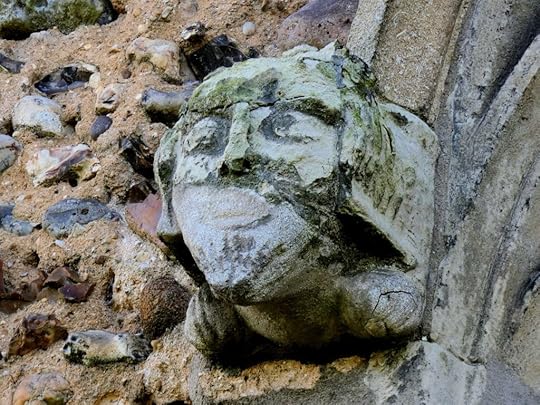 A face from the 701 years ago stared down at me.
A face from the 701 years ago stared down at me.
 The original medieval iron grilles both secure and protect the delicate leaded glass behind them.
The original medieval iron grilles both secure and protect the delicate leaded glass behind them.
 Another well-worn face.
Another well-worn face.
 Metal Crosses and Brick Tomb. Click on photos to see them.
Metal Crosses and Brick Tomb. Click on photos to see them. We spent a little time looking around the outside of the church before walking on. The roads leading to and from the church are very quiet. The only real traffic goes to the gravel pits by its own road, which was built to avoid Bradwell village itself. This will all change once the new road comes through as it will put the gravel pit and the church on the opposite side of the new road. So Ana and I try not to think about all that we will lose in the future. The new houses in our village has already taken away two of the walks we used to enjoy.
On this walk we saw Horsetails (Equisetum telmateia) growing by the side of the road in an overflowing ditch. The water was fast moving after the heavy rain. The Horsetails we saw was one of twenty species that is found on the Earth today. They are the only survivors of an ancient group of plants known as Sphenopsida. This family of plants also includes many of the trees that grew in the coal forests 250million years ago.
Along the top of a bank on a bend in the road we walked down we found lesser periwinkle growing. Its bright blue flowers shone in the sunshine. In medieval England garlands or crowns of this plant were sometimes worn by people about to be executed as it was a symbol of immortality.
 Lesser Periwinkle
Lesser Periwinkle
 Horsetail
HorsetailWhat does the Power of Belief mean to you?
The author Miriam Drori sent me an email asking me this very question as she was going to do a series of articles about the power of belief on her blog. Today, she posted my answer. If you would like to read my reply to this question, please check out this link.
Tomorrow, I’m going for my vaccination to help fight the virus.
Have a great weekend,
Chat with you all again soon.
March 18, 2021
Tearoom Guest’s Chat: Liz Harris
Welcome to Clubhouse Chat page. Those of you who are not a member won’t be aware that the location of the Clubhouse is shrouded in mystery. The only way to visit it is via membership or an invite to the tearoom. Every few days, I’ll be sharing a conversation with all sorts of writers and authors at different levels of their writing careers. Over tea and cakes, or maybe a glass of something stronger, I shall be chatting with my guest about their work in progress, or latest book release.
 Photo by Toni Cuenca on Pexels.com
Photo by Toni Cuenca on Pexels.comToday, I’m welcoming Liz Harris to the tearoom to chat about her writing. Welcome, Liz and as always my first question is what refreshment would you like to have before we begin?
Thank you so much for inviting me to drop in, Paula. Could I have a gin and tonic, thank you.
Now we have our drinks let’s begin by asking you when you first began your writing journey what drew you to your chosen genre?
My very first book was aimed at Mills & Boon. I hadn’t read any of their books, but saw that they were 50,000-55,000 words only, with no need for a sub plot, and thought, I can do that! So I did.
I wrote a novel called Starring the Bride, and sent it in. I put champagne in the fridge, ready for when the letter of acceptance arrived – after all, I’d taught English for years so I knew all about Plot, Language and Characterisation – and I waited, mentally swaggering somewhat.
The reply was couched in very pleasant terms, but to the point. You cannot start a Mills & Boon with an attempted rape! I was advised to go away and read some Mills & Boons.
That started me on a writing journey, which introduced me to the RNA, and which has taught me so much over the years. I soon discovered that teaching Literature is a very different skill from writing it. And that first instruction from Mills & Boon is still probably the best bit of advice I’ve ever had – read as widely as possible the books in the genre you’re targeting so that you understand the conventions of the genre and the expectations of your reader.
PS. It took me seven of writing before I was accepted for publication. I’d drunk the champagne about three years earlier. Instead of drinking it in celebration of success, on a forlorn day, I’d used it to drown my sorrows at not yet having a publisher.
PPS. My answers won’t all be this long. I promise.
Tell us a little about latest writing project. Is it a new idea, or one you have been mulling over for some time?
My latest writing project is a new series, The Colonials. The series will comprise three novels set in the 1930s, located in different parts of the world, and peopled with different characters.
The first, Darjeeling Inheritance, is set in – yes, you guessed it! – Darjeeling, at the time of the British Raj. It takes place on three tea plantations. The novel, which will be published in October 2021, will be followed by Cochin Fall and then Hanoi Spring.
I spent a magical three weeks in India a few years ago, researching the first two novels in the series, and I travelled the length of Vietnam early last year, researching Hanoi Spring. And the bonus was that the trips, or a part of them, were tax deductible!

How many unfinished projects do you have on your computer?
None.
I hope I don’t sound like a nerd.
The book I’m working on is a work in progress, not an unfinished project.
Each of my books is a project, and I would never start a new book while I had another book on the go. The characters live in my head as I write the novel – I can’t imagine having the characters of more than one book, and all their dilemmas, in my head at any one time.
In my above comment, I’m considering the book/project to be ‘finished’ when I’ve edited it to make it the best I possibly can, and submitted it for editing.
I realise that technically it won’t be finished until the editing is done and dusted, but at the point of submission, the book has been written, and I’ve never so much as once – and I was first published in 2012 – been asked at the editing stage to make structural changes.
So when I’ve sent the book in, that project/book is finished, and I start on the next book, knowing that I’ll have to pause when I get the edits back.
Do you write a synopsis first or write the first chapter?
First, I research the book, building a headed online file for every aspect of my research, such as for Climate, Flora & Fauna, Houses, Transport, etc, so that I’ll be able to access that topic when I need it.
By the time I’ve done that, a story line has developed. This is because the characters and story will grow from my research. I know the environment, and the history of that period, and I outline a story that draws on both the history and the location.
I don’t write a synopsis or a detailed outline. This is because I know the station from which the train leaves, and the station where it’ll arrive, and also the large stations in between, but I don’t yet know the smaller stations where the train will stop. I won’t know those till I’m writing the novel, and standing in the shoes of my characters.
I then write the first chapter.
Were any of your characters inspired by real people?
I have a free book for newsletter subscribers, Word Perfect, that’s set in Los Angeles. In that novel, I’ve used one or two experiences from my six years in California, and some of the characters are drawn from my friends at that time.
What’s more, I have deliberately given a character the surname, and the job, of someone I knew when I was in LA. It’s an unusual name, and if his relatives read the book, they’d recognise about whom I was thinking, and might contact me. I’d like that.
In the novel that has been my free book, and which is going to be sold in June, The Best Friend, Terri Lee Taylor is based on another friend I knew in the days I lived in California. I changed her surname. I’m hoping that if ever she came upon my novel, she would recognise that it was written by her former partner in crime, and contact me. I lost contact with her when real life intervened and I had to get the next flight back to the UK.
So, yes, some of the characters are inspired by real people. And I’ve drawn attention to this in the novel with a reason!
With the Linford Series, of which The Lengthening Shadow is the final novel, I was inspired by the places I know, and by a period that I love – the three books are set between the wars – and my characters rather grew out of that.
Having said that, I imagine that most of my characters are inspired – in terms of their characteristics, rather than the plot – by the people who are, and always have been, a part of my life.

Is there anything about you your readers might be surprised to find out?
My bio gives several details about me, which were invariably dwelt upon in the radio broadcasts I did when the earlier novels came out, so they may not be a surprise for everyone.
If anyone doesn’t know, however, I used to work on Sunset Strip in a clip-strip joint. I was a cocktail waitress, I hasten to add, not a stripper, though the ghastly item I had to wear, purchased from Fredericks on Hollywood Boulevard, left little to the imagination. (No, I’m not including a photo of me thus clad!)
The name ‘clip-strip’ came from the stripping element, obviously, and the fact that customers were unknowingly limited in the amount of alcohol in their glass. It was the absolute minimum you could put and still taste alcohol. If you put less, you’d taste only the mixer; if you put more, you’d cost the club unnecessary money. There was an almost invisible line on the glass so that the waitress knew when to stop pouring the alcohol.
We were checked before we left the behind-the scenes-area with the ordered drinks. The manager made sure you hadn’t hauled your bodice too high, and that there wasn’t too much alcohol in the glass. If you’d put too much in, you had to pay for the drink from your tips.
Did you uncover things about yourself while writing your books, whether that be a long forgotten memory, a positive experience etc.
I learnt, years after writing my first full length novel in about 2008, which is scheduled for publication in 2023, that the story was inspired by something that happened to me, and I hadn’t realised that when writing the book. Not for one moment. It had long been locked in the recesses of my mind.
After I’d finished writing the novel, a top agent took it to publishers, fulsome in her praise for the characterisation, pace, etc, but she was repeatedly told that because I was unpublished, they couldn’t take it on. It had a dark theme, they said, but had I been published, with a fan base, they would have felt more confident of finding a readership. As it was, I was unpublished.
I put it on the shelf, so to speak, and started on a book that I thought might sell more easily.
I still hadn’t connected the first book with anything in my life. It was only when a sleep problem a few years ago sent me to someone for help, and we talked, that it hit me with a force I can’t describe, what I’d done in that first novel. I just hadn’t seen it, not when I was writing it, not afterwards.
The experience, therefore, that was uncovered after years of being blocked, wasn’t positive in any objective sense, but there was a positive element in that we are all the product of our experiences, and the more we understand ourselves, the more we understand our characters and can give them human nuances, which lift them off the page.
Thank you so much for the invite to the tearoom, Paula. I’ve thoroughly enjoyed talking to you today.
It was lovely having you here today in the tearoom, Liz. If you would like to find out more please click on the link below:
Find my books: http://www.lizharrisauthor.com
Here are the universal links for the last three Linford books:
getbook.at/The DarkHorizon
mybook.to/The LengtheningShadow
Social Media Links:
Twitter: @lizharrisauthor
Facebook: Liz Harris. https://www.facebook.com/lizharrisauthor
LinkedIn: Liz Harris
Instagram: liz.harris.52206
Pinterest: Liz Harris
Book Bub: Liz Harris
Amazon Author Page: Liz Harris
If you want to find out more about Clubhouse Members’ Books, don’t forget to check out the Clubhouse Bookshops too.
A Walk Back in Time

This morning’s walk toward us across what is left of the old airfield. The ground was still muddy as we had more rain overnight but still it was lovely to walk in a different direction. The skylarks (link to hear the bird’s song) are singing sweetly while they can as they rely on farmland to build their nests. They rises several hundred feet vertically in hovering flight, sustaining its clear warbling song for several minutes at a time. Then it sinks down, singing until it is near the ground. It runs across the ground towards its nest hidden in the grasses or crops. Their main food is mainly seeds, insects and their larvae. With all the new homes being built in the area I’m hoping we won’t lose the skylarks.
The walk took 116 minutes so my apps says. It took us to the Polish Camp which is now an industrial site for small businesses. After World War Two the Polish Camp was used to housed displaced people. Polish Army personnel released from prison camps on the continent arranged themselves into a strong community and were joined by their families and other Polish servicemen who were being demobilised from the armed forces.
As we walked along the edge of field we could see in the distance that the new houses are growing more quickly than the crops on the fields around them. Though, the farmer has planted quite a few shrubs along the edge of the field, but the rest has been left uncultivated.
At the side of a track a few pheasants were feed on old maize, which is grown for the game birds ready for the hunting season. We followed the track that took us pass the old buildings and a wooded area. As we completed a full circle we came back on ourselves but on the far side of the wood and followed the track that took us across a muddy field. It was already planted up with a cereal crop.
Crossing over the main road into the village, we followed the footpath towards Rivenhall Place, a large house that stand in its own parkland and dates back to 1086 when it was held by Earl Eustace of Boulogne at the time of the Domesday Survey. It passed to the Crown by the marriage of Eustace’s daughter, Matilda, to King Stephen. The Scales family were in possession from the thirteenth century until the death of Thomas, seventh Lord Scales, in 1460, so it has a long history. I will tell more another day.
So back to my short story now after doing some marketing for my new novel and for Stone Angels.


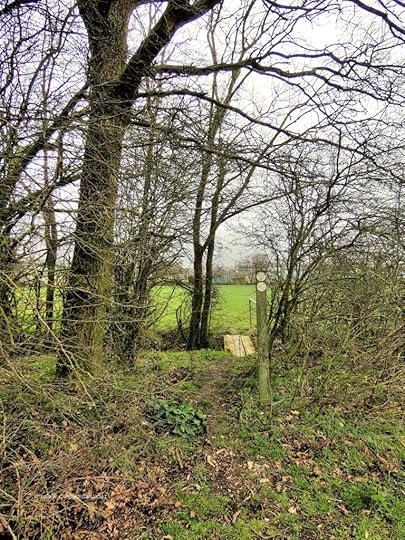













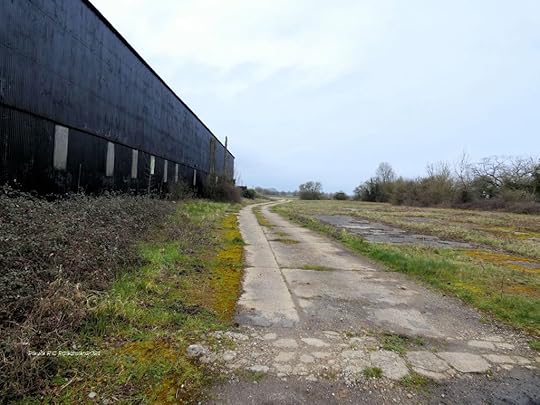
March 17, 2021
A Muddy Morning Walk

This morning walk was very muddy as we headed towards the woods. There wasn’t much to see in the way of wild life though we saw muntjac tracks in the mud and a buzzard flew out of the woods as we entered. There was the odd squirrel taking to the trees as we followed the path. Under the trees, primroses were adding a splash of yellow. Dog mercury was clearly visible in the woods and soon will be a carpet of green. Dog’s mercury is highly poisonous and hence became known as ‘False mercury’ or ‘Dog’s mercury’. Ingestion of this plant can lead to vomiting, jaundice, coma and eventually death.
Through primrose tufts in that sweet bower. The periwinkle trailed its wreaths; And ’tis my faith that every flower enjoys the air it breathes
Wordsworth
My friend Ana and I walk for 118 minutes so our app tells me now I’ve checked. We are hoping to walk again tomorrow, but the weather forecast shows thick cloud, a gentle breeze with the risk of rain later.
Yesterday, I spent most of the day marketing across the internet and I think I’m getting the hang of it. I keep an eye open for anyone looking for a recommendation for their next read. Then I post a photo of my book cover with a brief description of it. I always word my post ‘You might be interest in my Gothic Crime Novel Stone Angels. Then put my link to the book in the comment box and don’t use the Amazon link. Yesterday, I think I got two sale that way.
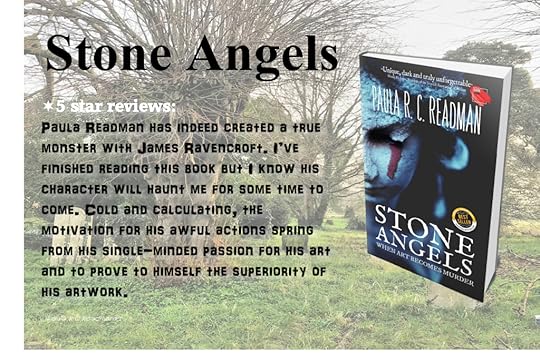
My Alice story is slowly almost painfully coming together. I’m over the first 1k mark now, but I think my mind is on the fact Saturday I get my first jab to help fight this terrible virus. Hopefully, if everyone takes up the offer Britain will be able to get back to normal life soon. I’m a little nervous about having it, but I would rather take my chances with the vaccination than getting the virus. People who have survived the virus are suffering with long term problems. My second jab is in June so fingers-crossed.
Back to my short story now. Best wishes and keep safe, everyone 




March 16, 2021
Lost In Wonderland

Alice has me lost in Wonderland and I don’t know where I’m going… I don’t think Alice knows too.
Today, I didn’t go walking in the morning as we have more rain, instead I hit my exercise bike. Not so much to see apart from an untidy room. Hopefully once the car boot sales are back again, I can have a good clear out. I’ve found I’m a bit slow getting back into writing after stepping away from it for a few days. I think my mind is on the garden, but the bad weather has put a stop to me going out there. I have tomatoes and butternuts plants growing in pots on my kitchen window ledge. I enjoy being in the garden on a spring day when the sun has some warmth. Nothing makes you feel more alive than working with soil and planting vegetable plants you’ve grown from seeds. I save the seeds from vegetable I’ve bought during the winter months. I dry the seeds off and store them ready for the spring.
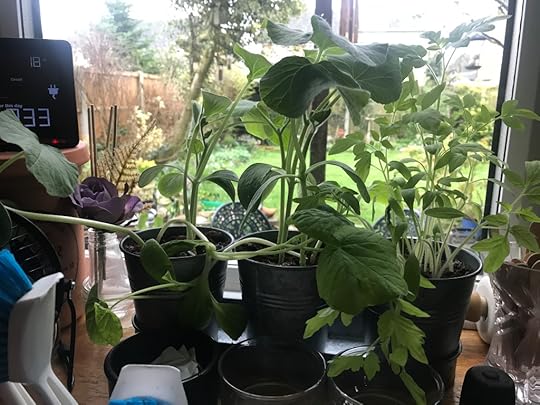
I’ve finally found the thread I needed to get the words flowing with my Alice story. In the story, White Rabbit has become humanoid as I have given him the opportunity to speak. He still dresses with his top hat, waistcoat and breeches, but I’ve changed a few other things to. The outline to the theme of the book means each of the thirteen writers have been given a premise in which we have to work from. Mine is Crime in a supernatural sense. The theme was that Alice has been set up and why? Again, it has to be speculative.
Alice came to a fork in the road and asked the Cheshire Cat ~ “Which road do I take?”
“Where do you want to go?” Asked the Cheshire Cat.
“I don’t know.”
“Then it doesn’t matter,” answered the Cheshire Cat and went back to sleep.
Alice through the looking glass.
Originally, I was just going to allow Alice to narrate the story, but I couldn’t carry it forward. By allowing White to talk it changed the flow of the words and has kick-started the story much better. I still can’t see where Alice is taking the reader or what the crime she’s about to become involved with, which is annoying. I shall have to keep working at it. So far, she has a note which has been slipped under her door, and a small gold key with a label on it.
So I better get back to finding out where White Rabbit has gone. I feel there could be trouble ahead.
Bye for now.
 Image by Prawny from Pixabay
Image by Prawny from Pixabay
March 15, 2021
Clubhouse Guest’s Chat: Paul Flewitt
Welcome to Clubhouse Chat page. Those of you who are not a member won’t be aware that the location of the Clubhouse is shrouded in mystery. The only way to visit it is via membership or an invite to the tearoom. Every few days, I’ll be sharing a conversation with all sorts of writers and authors at different levels of their writing careers. Over tea and cakes, or maybe a glass of something stronger, I shall be chatting with my guest about their work in progress, or latest book release.
 Photo by Adrianna Calvo on Pexels.com
Photo by Adrianna Calvo on Pexels.comWelcome to the tearoom, Paul. Let’s order our drinks first. What would you like?
Thank you for the invite. Today, I will choose a decaf latte with plenty of sugar please.
Great. Let’s start by asking you when you first begun your writing journey what drew you to your chosen genre?
I think it was always about what I read. When I was a kid it was all about fantasy, so that influenced what I wrote then. As I got older and into my teens, I discovered horror and was drawn more to that genre. Into adulthood, I fall a little between the two schools. I’m neither a straight ahead horror writer, and neither am I a fantasy writer. I get slotted into both categories pretty often, so I go with horror and dark fantasy to label myself. It seems easier that way, and I guess it stops readers making assumptions about how extreme (or not) my stuff is.
What writing elements do you think is your strongest points, and what would you like to do better?
I like to think I write a good, all round story. A comment that keeps coming back is that it’s easy to visualise my stories, and they tend to be quite cinematographic. That’s something I’m pretty proud of. I know my weakness is often around dialogue and dialogue tags. It’s either too much, or it’s not enough. It is something I’m always working on and experimenting with, but striking that balance is quite tricky.
Tell us a little about latest writing project. Is it a new idea, or one you have been mulling over for some time?
Well, I just released my short story, Defeating The Black Worm with Demain Publishing. I’ve had it around for about a year, but been debating whether to publish it because its quite a personal one. I wondered if it was a little too close to the bone. In the end I re-read it and figured it was a good story and should be read. It’s bleak, it’s dark… its pretty enjoyable. I also have a novel finished, which is the first in a trilogy. I’m holding that back until I have the second book done. I’m a little unsure of the order of the second and third books, so it’s a case of wanting to do it in the right order before I hit submit and become son of George RR Martin as I try and figure it out. I’ve been toying with it since I was a teenager, so a little longer won’t hurt. I also have a standalone horror with my editor right now, so that will hopefully see the light of day this year. And I have two works in progress that I’m actively working on. One of them is the second trilogy book, and another horror.
[image error] Paul FlewittHow many unfinished projects do you have on your computer?
Too many. During the last lockdown I committed to looking through them and finishing a few. There was a lot of good stuff in there, and one is with my editor as we speak. There’s still far too much though, mostly stuff I lost interest in, or that I lost my way with. I handwrite all first drafts, so I literally have a box by my bed that’s full of partly written shirt stories and novels.
Do you write a synopsis first or write the first chapter? If you only write short stories, do you plan your story or let the characters lead you?
I hate synopsis writing. Blurbs and synopses are the hardest part of writing for me. It really is the work of the devil. I start with an idea, usually a character name. Often I have a title, and I work from there. My brain is like a filter, so ideas tend to come and go, but the ones that nag at me for a few days are the ones that get written. In that filtration period, I’ll have built a good idea of how the story begins and how it ends. From there, I just write from point A to point B.
Choosing only five of your favourite authors. Can you list them in order 1 begin the top of your list and say how have they influenced your writing?
That’s a bloody hard one because there are so many writers that I admire. Tolkien was the first writer I fell in love with. I read Lord of the Rings and didn’t want to leave Middle Earth. I wanted to live there, and then I wanted to create a world that would be just as loved. Of course, you have to write for that to happen. Stephen King was the next one that seeped into me. Again, he created some worlds that I didn’t want to leave. I loved the atmospheres he created with words and his characters. HP Lovecraft isn’t a great writer by any means, and viewed through a modern prism is pretty controversial with the views he espouses in some books. His ideas though, cannot be denied. He melded horror and fantasy, bringing it into the real world in a way that I really appreciate. Edgar Allen Poe is just poetry. I can listen to people read Poe, or read him myself and be transported back to his time. I was lucky enough to be included in a Poe tribute collection last year, which was a great honour for me to be able to pay homage to the man. Lastly, I have to reference my favourite author of all time: Clive Barker. He opened my eyes to many things around imagination. I term him my naughty nanny from my teen years, who raised his literary skirts and let me see everything. He taught me that nothing is out of bounds, and that there is beauty in the grotesque. He encapsulates everything that I love about the first writers I listed, and brings so much more. I aspire to use the lessons those writers taught through their writing to make me better, and it really is an ongoing thing.
What is your work schedule like when you’re writing?
Nobody that I know personally. I do crowd watch, and sometimes interesting people pop up on the streets and find their way into my stories. One example is a homeless guy I saw in the street when I was a teen, and he became the central character in my trilogy. He looked like a guy who had seen things, and so a story weaved itself around him.
How many hours in a day do you write?
It depends on the day. I try for a couple of hours each day, which is a challenge wit homeschooling through lockdown. If I get more than two hours in, that’s great. I don’t punish myself though. Any day that I get words down is a good day. The only real set rule I have is that I don’t work weekends. Those are for family and recharging.
How do you select the names of your characters? Do you know everything about them before you start writing their story?
Names just pop into my head. I don’t really go looking for them. I generally have a sketch of who they are in mind, but as a rule they develop and gestate as I write about them. I find their voice through the dialogue, and they build into their own beings.
How long on average does it take you to write a book?
How long is a piece of string? It really depends on the project. Some can take a couple of years, while others might only take a few weeks. As I mentioned earlier, I write every first draft longhand, so it always takes me longer than most. Again though, I have no set rules. They take as long as they take.
Thank you for joining me in the Clubhouse. You can find out more about Paul’s work by click on the links below:
Facebook: PaulFlewittAuthorofDarkFiction
Twitter: @RealPaulFlewitt
Insta: PaulFlewittAuthorofDarkFiction
Wattpad: @DarkFantastique
Amazon: https://www.amazon.co.uk/s?k=Defeating+The+Black+Worm&ref=nb_sb_noss
If you want to find out more about Clubhouse Members’ Books, don’t forget to check out the Clubhouse Bookshops, too.
March 14, 2021
Book Launch Chat: P.L. Stuart
Welcome to Clubhouse Chat page. Those of you who are not a member won’t be aware that the location of the Clubhouse is shrouded in mystery. The only way to visit it is via membership or an invite to the tearoom. Every few days, I’ll be sharing a conversation with all sorts of writers and authors at different levels of their writing careers. Over tea and cakes, or maybe a glass of something stronger, I shall be chatting with my guest about their work in progress, or latest book release.

Today we are here to help P.L Staurt launch his book A Drowned Kingdom. Welcome and congratulation on your book.
Thank you for the invited to the tearoom, Paula.
Let’s start by asking you did you try to be more original when writing this book, or deliver what you felt the readers wanted?
Toni Morrison said, “If you find a book you really want to read but it hasn’t been written yet, then you must write it.” That for me was A Drowned Kingdom. I had a book – indeed a long series of books – inside me, bursting to get out. I believe it’s an original, one-of-a-kind book, and the series will be unique, and not feel derivative of other fantasy works. Make no mistake, there are similarities of who I consider to be the great fantasy authors in my work. You can’t write great fantasy without looking to Jemisin, Tolkien, Martin, etc. as inspiration. Still, I have written something quite different from those great authors. I hope the readers enjoy it. I wrote it for them to be delighted. Nonetheless, I wrote it the way I wanted to write it. I had to be true to myself in my journey as an author. To write only for potential readers, for me would have been disingenuous. Then I would not be telling the story that wasn’t out there yet, but the one I envisioned. We’ll see if they like what I have to say and how I have to say it.
Did you feel energised or exhausted after writing this book?
Much more energized and elated at first upon completion, but soon quite tired! The exhaustion for me did not set in until I turned to the book publication side, and I gave myself a bit of a break between writing novels for this purpose. There was no rest after finishing the actual final draft of A Drowned Kingdom. Then it was onto editing, proofreading, design, and layout concerns, pricing, and so much more. As an Indie author you are heavily involved in all those aspects. It’s all the other business associated things with being an authorpreneur – social media presence, branding, publication details – that take up a lot of time and can leave one exhausted. Fortunately, I have my lovely and talented wife Debbie as my partner in this enterprise. She is extremely smart, dynamic, and has a background in marketing. She is my business manager and handles the bulk of the other work – which is more than half the load of being an Indie author – so I can focus more on writing. Without her I’d be sunk! Not complaining about being tired however, I am privileged to be able to be an author, and I know it. So, in summary, I don’t find the actual writing tiring, but the rest of being an author can wear you out, if you are also coping with working another full-time, shift-work job.
Do you want each of your books to stand alone, or are you building a body of work that is interconnected? Whether that be a theme, a set of characters, a setting, etc. Explain more for our readers.
I am certainly building an interlinked body of work. A Drowned Kingdom, my debut novel, will be the first book in The Drowned Kingdom Saga. The Drowned Kingdom Saga is a planned seven-novel series. After the conclusion of The Drowned Kingdom Saga, two further prequel trilogy series are planned to follow: a total of six more books. When those two prequel trilogies are published, a subsequent continuation of the original story begun in the first saga will commence. This continuation will likely be another thirteen books. Therefore, the entirety of my writing will be based on the world first realized in A Drowned Kingdom.
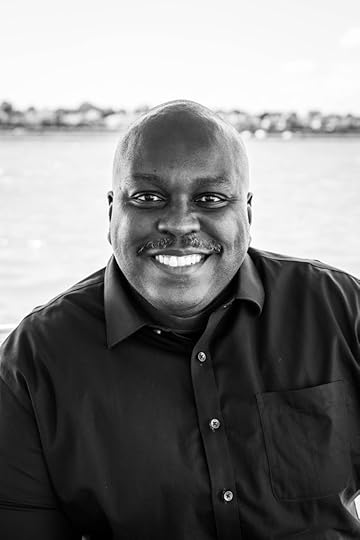 P.L Stuart
P.L Stuart
How do you balance your demands on the reader with taking care of your readers? In the book did you spell everything out, so your reader just had to read it, or did you rely on their emotional response to your words?
I believe I write in a straightforward style. The reader will, for the most part, have many elements of the book quite clearly spelled out, making A Drowned Kingdom an easy read in some ways. In other aspects, the individual reader’s subjective response to my words may take them in different directions, depending on the reader. I don’t want to be ambiguous here in my response. But that’s all I can divulge for now, without giving away too much of the plot.
Do you hope your book will deliver you literary success and how will this look to you?
Literary success is hard to define. I suppose if I achieve a combination of both critical acclaim and commercial success, I would be quite pleased, but how do you measure that? Who, if anyone, do you measure your “success” against? Without being morbid, if you are well-known, still widely read, and selling books long after your death, i.e. Tolkien, C.S. Lewis, T.H. White, I believe you are successful. So, if you have an enduring legacy as a writer, you’re successful. But you won’t be around to see it. In one’s lifetime as an author, it’s easy to look at G.R.R. Martin, Mark Lawrence, J.K. Rowling, etc. and use them as a top benchmark to denote if you’ve “arrived” as an author, but those are extremely lofty comparators. Do you set them as “the ceiling”, and choose other lesser-known authors as “the floor”, and gage by that sort of standard where your own work ranks? I believe I will just “know” when, subjectively, I’ve done well as an author. If consistently, people appear to love reading and are willing to buy my books such that it is emotionally motivating and lucrative for me to continue writing, I will feel I have achieved “success”. Ultimately, I believe if I can become a full-time author, and survive financially exclusively by writing, that is success for me.
Was there anything you edited out of this book, you wanted to keep in, but you knew it would be a better book by cutting it?
It’s funny, there was so much more I wanted to add to the book, but I have a sweet spot in my mind as both a writer and reader that I believe is ideal for novel length. Fantasy books tend to be longer than most other genres, and if you are G.R.R. Martin you can write a 1000-pager and it will be devoured by fans. But most writers, especially novice writers should be careful with their word counts. Once you are established, you can consider lengthening your future books if you need to. I believe fantasy readers want enough length they can sink their teeth into, that has a depth of worldbuilding. Yet not too long that they forgot what happened 700 pages ago and need to keep flipping to the list of characters to figure out who is who. I know how I feel as a reader about it, and I think around 400 pages give or take 100 pages, is perfect. That’s the length of books I intend to write. That’s 160-200 thousand words. That is still, by overall literary standards, a long book. I had one major plotline I cut out of A Drowned Kingdom that would have taken up potentially another 50 pages. I moved that plotline to the next novel in the series.
How long did you spend researching this book’s subject matter, or was it a book you had already planned?
Most of my research was done regarding ancient life, weaponry, implements, feudal systems, etc. Much of it I had, I feel, a fair handle on due to my major in University in English / Medieval Literature, and History, and reading books on the subject most of my life.
So there wasn’t a lot of major research involved. The benefit of writing fantasy is that you create the history, the world, the languages, etc. It needs to be realistic and make sense to appeal to the reader, but you don’t need to do the same sort of laborious research you would have to do, for example, a historical fiction novel. Although I can see how that would be a labour of love. I do enjoy historical fiction and likely would write in that genre if I didn’t write fantasy.

What was the hardest scene to write in the book?
Scenes that have an emotional impact on me personally, are typically the hardest to write. There are some interpersonal / family matters in A Drowned Kingdom, bits and pieces of which mimic bits and pieces of my own life. On the other hand, they can be cathartic, like therapy, writing those scenes. There are many of those scattered throughout A Drowned Kingdom, so it was quite the therapy session!
How will you cope with bad reviews on this book?
I won’t lie, the first ones I think will be difficult for me. As writer’s, many of us live in this paradox of wanting our work out there in the world to as wide an audience as possible and have them critique it – really have them love it. On the other hand, we are terrified of people not liking it, and almost want to keep our writing to ourselves for fear of failure. But I believe, like anything else, once there are relatively more positive than negative reviews, like most writers, I’ll cope well enough. I might find something very constructive in negative reviews that may help improve me as a writer. I will take those things under advisement and act upon them if I feel I can. It’s just those first few reviews, especially the professional ones, by entities such as Kirkus and Clarion, that are influential with readers, I will be on the edge of my seat, waiting for what they thought of my book.
What’s the one thing you would give up to become a better writer?
Well, I’d give up my full-time job! I am privileged to have a wonderful job, but if I could devote all my energies to writing, I would certainly improve as an author. That is my plan, one day, hopefully, to retire a bit early from that job, and just write.
Let me wish all of luck with your book sales. If you would like to find out about P.L. click on the links below.
Website link: www.plstuart.com Website: plstuart.com Twitter: @plstuartwrites Facebook: plstuartwrites\
If you want to find out more about Clubhouse Members’ Books, don’t forget to check out the Clubhouse Bookshops, too.
March 13, 2021
Stuck on Alice
Now my fourth book has been signed off by Darkstroke, my publisher, I’m ready to start work on my next project. I’m working on a short story called ‘Not another bloody rabbit hole.’ It’s one of thirteen dark tales that’s linked by the character, Alice from Wonderland. My tale’s theme is a supernatural crime and must be about Alice being set up. The other twelve tales are told by other writers. I took a few days off just so I could free my mind.
So what did I for a few days? Well, nothing very exciting.

Well, I caught up with housework. Yes, I know. Not the most inspiring thing I could have done with my time, but it helped to clear my head. This weekend I had hoped to start tidying my garden and preparing the vegetable plot for planting but strong winds and heavy rain has put a stop to that activity.
I did spend a day putting together a book trailer for Seeking the Dark . I used the program built into Windows 10 photo video editor. Every time I use it, I learn something new. I did buy a more complicated program but I haven’t had the time to work out how to use it. Windows 10 Photo is so quick and easy to use. After I selected a series of pictures I thought would tell the story from Pixbay(.)com I added music and special effects to create the slideshow. Windows 10 photo has a good selection of music and special effects you can add to a video to make it more interesting. Once I was happy with it, I loaded the finished video onto YouTube. I hope you enjoy watching it as much as I did making it.
I’m just hoping Seeking the Dark appeals to all readers as the story isn’t quite what readers of vampire novels will expect. I thought long and hard about the cover, as I’m sure I have already mentioned. I’m hoping the book trailer for Seeking the Dark will encourage more readers of all sexes to want to read it even though there’s no romance in the story.
Please let me know what you think of the book trailer, thank you.
Now I’m off to get Alice out of another rabbit hole 
Have a great weekend.
March 11, 2021
Book Launch Chat: Jim Bates
Welcome to Clubhouse Chat page. Those of you who are not a member won’t be aware that the location of the Clubhouse is shrouded in mystery. The only way to visit it is via membership or an invite to the tearoom. Every few days, I’ll be sharing a conversation with all sort of writers and authors at different levels of their writing careers. Over tea and cakes, or maybe a glass of something stronger, I shall be chatting with my guest about their work in progress, or latest book release.
 Photo by cottonbro on Pexels.com
Photo by cottonbro on Pexels.comToday, I’m chatting with Jim Bates on the launch of his book, Resilience, a collection of short stories. Welcome to the tearoom, Jim.
Thank you so much for your invite to the tearoom, Paula.
You’re very welcome, Jim. Let’s start by asking did you try to be more original when writing this book, or deliver what you felt the readers wanted?
I will always be indebted to Gill James at CafeLit because she was the first person to publish any of my stories. When I began putting together stories for my single author collection, I chose stories that she had already published. Then I added more that in my mind kept with the theme of the book. Hopefully, if people liked what had been published on CafeLit they will like the stories in this collection.
Did you feel energized or exhausted after writing this book?
I felt completely energized putting this book together. I went through all of my stories and picked my favorites. I made with a chart that listed the stories and their word count. Then I started whittling away. I started with almost one-hundred stories and ended up with twenty-seven. I enjoyed the entire process.
Do you want each of your books to stand alone, or are you building a body of work that are interconnected? Whether that be a theme, a set of characters, a setting, etc. Explain more for our readers.
All of my books will stand alone. “Resilience” is my first published collection. But this could be a big year for me. I have a collection of thirty-one stories right now in the final editing stage with Impspired Publications. It’s called “Periodic Stories”. These are stories of approximately one-thousand words each built around the first thirty-one elements of the periodic table. Chapeltown Books has my collection of thirty-one flash fiction stories and drabbles called “Short Stuff”. It is ready for publication. I have a thirty-two thousand dystopian novella called “Something Better” ready for final editing through Paper Djinn Press. I have submitted a seventy-thousand-word manuscript called “Against the Grain” to The Terror House for consideration for publication. And I won a contest and a publishing contract with Clarendon House Published for a series of short stories entitled “Do You Believe in Magic?” which will be coming out toward the end of this year. All of these collections have the same general theme of my first book “Resilience” in that a character is faced with life’s challenges and somehow finds a way to survive and grow and become, in most cases, a better person having faced that challenge.
How do you balance your demands on the reader with taking care of your readers? In the book did you spell everything out so your reader just had to read it, or did you rely on their emotional response to your words?
My stories are designed to emotionally engaged my readers. Hopefully, they entertain as well! My goal is to have a reader finish a story, nod their head, smile and say to themselves, ‘Yes, I get it. I can relate to that.’ If I can connect with a person on an emotional level like that and leave them feeling something, be it happy or sad or whatever, then I feel I’ve done what I set out to do, and that’s to write an entertaining story that a person can relate to.
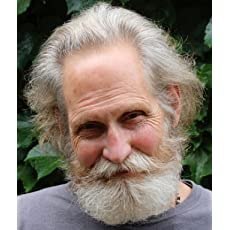 Jim Bates
Jim BatesDo you hope your book will deliver you literary success and how will this look to you?
Literary success comes on a couple of levels for me. The first one I have already achieved. I have a book in print with my name on it! That, in and of itself, is a tremendous achievement for me since I was never considered a very bright person. Challenging myself to do the best I could and writing stories that people enjoy and having those stories published means the world to me. It’s made me very happy. The other part of success is my readers. Will people like my book? Will they even buy it? What if no one buys it? Putting my stories out there for people to read means I will have to accept all forms of critique and criticism. Worst case scenario is that no one buys “Resilience”. I’d feel bad for Bridge House if that happened. They took a risk with me. I hope I sell enough to at least cover their costs. That would be awesome if that happened. Me? If I make some money, that’s fine, but I’m not doing this to make money, only to get my stories out there and entertain people and, hopefully, make people smile a little.
Was there anything you edited out of this book, you wanted to keep in, but you knew it would be a better book by cutting it?
No. My editor, Linda, was excellent in helping cut extra verbiage or add more to a story if it was warranted. I’m extremely pleased with her input and the final result.
How long did you spend researching this book’s subject matter, or was it a book you had already planned?

In 2015 I started to seriously begin writing stories. Once I made that commitment, they started tumbled out of my brain pretty much non-stop. And they still are!
What was the hardest scene to write in the book?
None of them were hard to write. If I can put myself in the mind of a character, I can write just about anything. Getting into their mind set is the main thing!
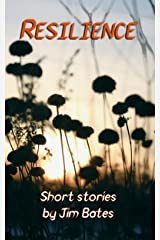
How will you cope with bad reviews on this book?
I’m ready for them. I used to work for a company where me and my team wrote training manuals based the requirements set forth by our customers. Everything (everything!) we wrote was scrutinized. Nothing was ever good enough. Changes were always made. Critiques were common and criticism was a way of life. So, with “Resilience” I’m expecting I will receive some less than stellar views. It’s the nature of our business. My stories aren’t for everyone, I accept that. And if criticism is warranted, I’ll accept it, as well. If it’s not, I’ll try not to let it get to me. Too much!
What’s the one thing you would give up to become a better writer?
Hmm. That’s a good question, Paula, kind of like, “Would I sell my soul to the devil?” Here’s how I’ll answer it. I was brought up to work hard and to take pride in a job well done, and that’s the way I feel about my writing. I love to challenge myself to be the best I can be. I love to step out of my comfort zone sometimes and attempt writing in a different genre. I feel I am always striving to be better. I like the work aspect of writing. My brother says that writing is my job, but in a good way, and I go along with that statement. I write every day even if I’m not ‘in the mood’ which rarely happens. I love what I do; it makes my life whole. So, what would I give up to be a better writer? Nothing. I love the process of pushing myself to be the best I can be. If I traded something for it, I’d miss the learning process, and that, for me would be a real bummer.
Congratulation on the launch of your first collection of stories, Jim. I wish you lots of luck with the sales of your book.
If you would like to read more of Jim’s writing please check out the links below.
Amazon Author’s Page: Jim Bates
Jim’s Blog: The View From Long Lake
If you want to find out more about Clubhouse Member’s Books don’t forget to check out the Clubhouse Bookshops too.

